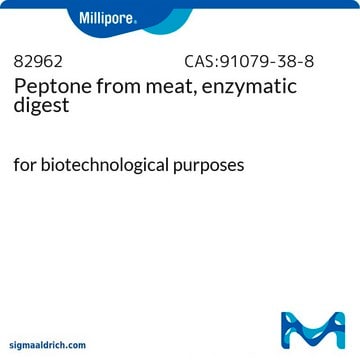81260
Poli(etilenglicol)
average Mn 6,000, hydroxyl
Sinónimos:
PEG
Iniciar sesiónpara Ver la Fijación de precios por contrato y de la organización
About This Item
Fórmula lineal:
H(OCH2CH2)nOH
Número de CAS:
MDL number:
UNSPSC Code:
12352104
PubChem Substance ID:
NACRES:
NA.23
Productos recomendados
product name
Poli(etilenglicol), average Mn 6,000
form
flakes
Quality Level
mol wt
Mn 5,000-7,000
average Mn 6,000
pH
4.5-7.5
mp
60-63 °C
Ω-end
hydroxyl
α-end
hydroxyl
SMILES string
C(CO)O
InChI
1S/C2H6O2/c3-1-2-4/h3-4H,1-2H2
InChI key
LYCAIKOWRPUZTN-UHFFFAOYSA-N
¿Está buscando productos similares? Visita Guía de comparación de productos
General description
Polyethylene glycol (PEG) is a hydrophilic polymer. It can be easily synthesized by the anionic ring opening polymerization of ethylene oxide, into a range molecular weights and variety of end groups. When crosslinked into networks PEG can have high water content, forming "hydrogels". Hydrogel formation can be initiated by either crosslinking PEG by ionizing radiation or by covalent crosslinking of PEG macromers with reactive chain ends. PEG is a suitable material for biological applications because it does not trigger an immune response.
Application
It has been used to modify therapeutic proteins and peptides to increase their solubility.
Photopolymerized PEG hydrogels have emerging applications in the fabrication of bioactive and immunoisolating barriers for encapsulation of cells.
Photopolymerized PEG hydrogels have emerging applications in the fabrication of bioactive and immunoisolating barriers for encapsulation of cells.
Related product
Referencia del producto
Descripción
Precios
Storage Class
11 - Combustible Solids
wgk_germany
WGK 1
flash_point_f
Not applicable
flash_point_c
Not applicable
ppe
Eyeshields, Gloves, type N95 (US)
Elija entre una de las versiones más recientes:
¿Ya tiene este producto?
Encuentre la documentación para los productos que ha comprado recientemente en la Biblioteca de documentos.
Los clientes también vieron
Joo-Hyung Choi et al.
Veterinary microbiology, 236, 108374-108374 (2019-09-11)
Foot-and-mouth disease (FMD) is a highly contagious disease and causes economic damage at a national level. In particular, the type O FMD virus (FMDV) is a serotype that causes FMD outbreaks most frequently in the world. In recent years, Southeast
Tuberous Sclerosis Complex Axis Controls Renal Extracellular Vesicle Production and Protein Content.
Fahad Zadjali et al.
International journal of molecular sciences, 21(5) (2020-03-07)
The tuberous sclerosis complex (Tsc) proteins regulate the conserved mTORC1 growth regulation pathway. We identified that loss of the Tsc2 gene in mouse inner medullary collecting duct (mIMCD) cells induced a greater than two-fold increase in extracellular vesicle (EV) production
Su-Hwa You et al.
Veterinary microbiology, 234, 44-50 (2019-06-20)
Foot-and-mouth disease virus (FMDV) is the cause of an economically devastating disease in major cloven-hoofed livestock. Although type C foot-and-mouth disease (FMD) has not occurred anywhere worldwide since 2004, the antigen bank should be preserved in preparation for an unexpected
Ji Hyeon Hwang et al.
Journal of veterinary science, 20(3), e29-e29 (2019-06-05)
Vaccination is one of the most effective ways of controlling and preventing foot-and-mouth disease (FMD) outbreaks. The effective prevention of this disease requires the use of high-quality vaccines to meet the criteria that enable customers to use them simply. The
Marc D Hein et al.
Applied microbiology and biotechnology, 105(1), 129-146 (2020-12-05)
The novel influenza A virus (IAV) defective interfering particle "OP7" inhibits IAV replication in a co-infection and was previously suggested as a promising antiviral agent. Here, we report a batch-mode cell culture-based production process for OP7. In the present study
Nuestro equipo de científicos tiene experiencia en todas las áreas de investigación: Ciencias de la vida, Ciencia de los materiales, Síntesis química, Cromatografía, Analítica y muchas otras.
Póngase en contacto con el Servicio técnico




